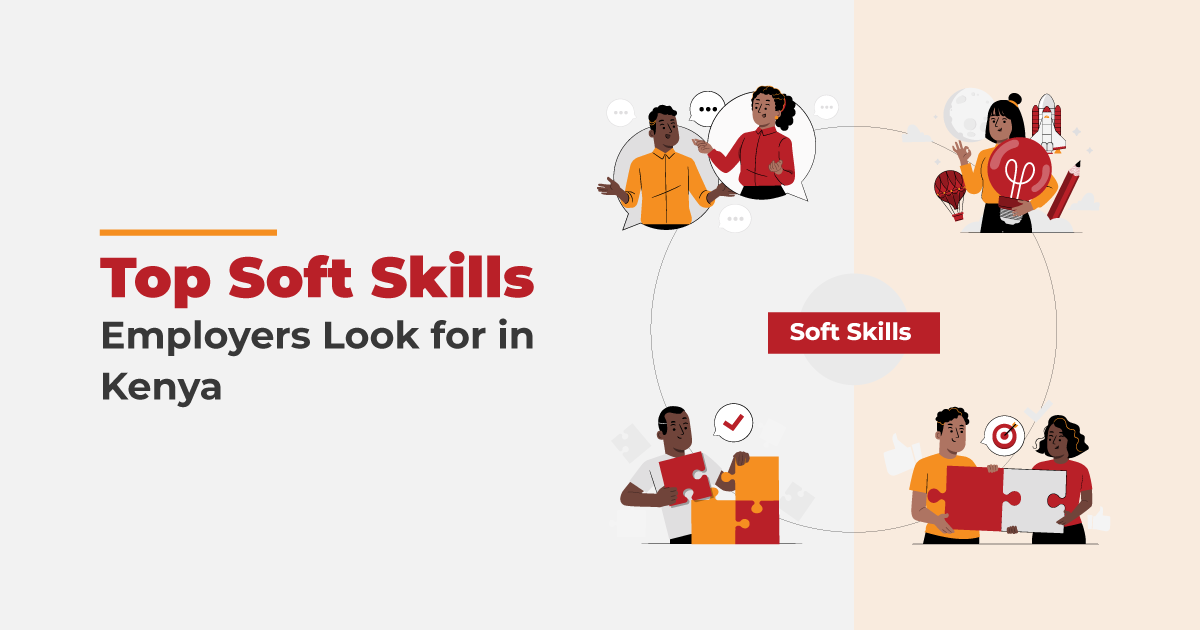Do you wonder what soft skills are and why they are essential in any workplace?
In today’s world, success in a role and company isn’t only determined by technical skills and knowledge. The nature of work keeps changing, so it’s important for individuals to portray attributes, attitudes, and abilities that allow them to collaborate with others.
This is where soft skills come into play. Have you identified a colleague whom everyone wants to work with? Or maybe a go-to-person when there is an urgent business issue. Perhaps the person has good soft skills.
Soft skills vary from communicating clearly, working well with people, adaptability, time management, problem-solving, and more. In this article, we’ll learn top soft skills employers look for in Kenya.
Table of Contents
What are Soft Skills
Soft skills are attributes and personality traits that allow people to interact and collaborate in a work setting effectively. Unlike technical or hard skills, soft skills are difficult to measure or quantify. These employability skills contribute hugely to the company’s success.
Did you know that employers rank soft skills higher than hard skills (technical skills)? This is because soft skills are very essential in the modern world. Knowing how to analyze data as a data analyst is important, but those skills don’t matter if you can’t do soft things.
The soft things involve communicating effectively, thinking critically, solving problems, leading a project, managing time, collaborating in a team, and much more. Soft skills are particularly important if you want to move from a mere contributor to leadership. Technical skills grow your career, but to really soar high, you need soft skills. Soft skills are critical to individual, team, and company success. Let’s look at the soft skills employers are looking for, in order to succeed in your job and when interviewing for a job.

Take the BrighterMonday Kenya Soft Skills course.
Top Soft Skills that Employers Look For
Communication Skills
Communicating clearly and effectively is a critical skill everyone should master.
Communication as a soft skill is very broad because it doesn’t focus on how you speak to colleagues, clients, and stakeholders alone.
Also, includes your body language, listening skills, how you share your thoughts and how you present yourself whether in person or via electronic mediums.
Communication involves speaking clearly and confidently. The ability to communicate effectively is a factor of professional success. Good communication skills are highly valued by employers from all industries and professionalism. Confidence is key if you want to communicate well. Being confident helps you express your thoughts and ideas clearly and persuasively. BrighterMonday is offering a free course to enhance your confidence.
Critical Thinking and Problem Solving
Critical thinking enables individuals to address problems and challenges at work with a strategic and analytical mindset.
Being a critical thinker means making sound and clear decisions and analyzing and resolving issues faster and more effectively. Having and mastering critical thinking skills is vital, as they are a soft skill employers look for.
In order to succeed in your role or your company, employers want individuals who come up with great ideas, execute them, make informed decisions and come up with timely solutions. You need to come up with original ideas as well as come up with solutions to solve existing problems.
Time Management
Time management is the ability to use your time wisely and be productive. It involves setting and adhering to priorities, organizing tasks, allotting time to activities, and finishing on time. This requires work discipline and a willingness to avoid distractions.
Mastering the art of time management is important for meeting deadlines, being organized, avoiding stress and anxiety resulting from missed deadlines, and working efficiently.
Employees who manage their time effectively are a plus to any organization. Employers and colleagues see them as a reliable resource, thus making them stand out.
Leadership
Did you know that leadership skills are critical for success in your profession? At your workplace, you need to show that you can influence your team to achieve goals by managing situations and team members.
Displaying this skill can make you noticeable and rise to executive positions.
Creativity
Creativity is another essential soft skill employers look for in Kenya. Employers want employees who approach challenges with courage and provide solutions that resonate with the business. Also, they want individuals who reason, think through problems logically, and come up with creative solutions.
Creative individuals help companies stay competitive by creating solutions that make the business succeed. Creativitivity requires:
- A curious mindset
- Questioning
- Experimenting
- Willingness to embrace uncertainties
Teamwork

Teamwork is the ability to work with others towards a common goal. To work together, there requires communication, cooperation, collaboration, sharing of ideas, brainstorming and much more.
Individuals who work together are likely to learn more from each other and achieve their professional goals. Working as a team also contributes immensely to the success of the organization.
Teamwork helps individuals work effectively. It also nurtures and fosters creativity, job satisfaction, as employees can deliver, and a positive work environment. Two or more heads are better than one. Employers embrace workers who can work with others for the organization’s success.
Adaptability
Technology is highly dynamic and changing how businesses operate. Staying updated and ahead of the curve is important, and this is where adaptability comes in.
Adaptability is a top soft skill employers are looking for among employees. Changes in the workplace are common in the modern world. Employers want individuals who can adjust and respond positively to changes that contribute to the success of the organization.
Adaptability means learning a new skill, embracing technology, adapting to new work styles and strategies so as to remain relevant in your role. Adaptability also comes with an openness and growth mindset. To succeed in your role you need to be able to adapt to different situations in your workplace.
Emotional Intelligence
Emotional intelligence is the ability to recognize and manage your emotions and those of others. This social skill enables you to remain resilient and stoic at a work.
Having emotional intelligence means you’re self aware, you’re empathetic about people around you, and develop work relationships that motivate others.
Mastering the art of emotional intelligence enables employees to navigate through complex environments and tasks so as to bring success in the organization. Also, It help’s employees contribute and work effectively within teams.
Employers value employees with a high level of emotional intelligence. According to research done by PSI CHI, “Emotional quotient (EQ) is a better predictor of success over Intelligence quotient (IQ) and technical skills. Also, Employees with a high EQ are more likely to be promoted to those with a high IQ.
Individuals with EQ are positive, respond to situations calmly, make logic decisions, are empathetic, and know how to manage negative emotions and stress.
Work Ethic

Work ethic means valuing work by giving your time and putting in your efforts to yield the best results. Employers want individuals willing to put extra effort without being pushed for the company’s success.
In order to succeed in a role or a company, you need to have a good work ethic. Work ethic means you’re:
- Responsible
- Committed to your work
- You’re professional
- You have discipline
- You’re dependable
Conclusion
To thrive in the modern workplace, employees need technical and soft skills. Technical skills are common among individuals. Therefore, employers are looking for employees who have soft skills.
- Soft skills such as:
- Communication
- Critical thinking
- Creativity
- Teamwork
- Adaptability
- Work Ethic
- Emotional intelligence and more skills
Soft skills are critical attributes to have to succeed in your workplace. They are hard to teach but can be developed and nurtured over time.
As you build up technical skills, remember soft skills pay off big. Developing soft skills can make you stand out and lead to long-term success. Invest your time and effort to evaluate and audit yourself to improve your soft skills.
BrighterMonday is helping employees and job seekers improve soft skills through holding soft and employability skills events. Sign up for our newsletter to stay informed about the events.
Visit BrighterMonday Kenya Learning to level up and enhance your soft skills today.
Happy learning!





